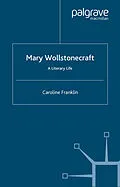This study argues that protestant society had traditionally sanctioned women's role in spreading literacy, but this became politicized in the 1790s. Wollstonecraft's literary vocation was shaped by the expectations of the power of print to educate and reform individuals and society, in the radical circles of the Unitarian publisher Joseph Johnson.
Autorentext
CAROLINE FRANKLIN is Reader in English at the University of Wales, Swansea. She is the author of Byron's Heroines (1992), Byron: A Literary Life (Palgrave Macmillan, 2000) and editor, with E.J. Clery and Peter Garside, of Authorship, Commerce and the Public: Scenes of Writing, 1750-1850 (Palgrave Macmillan, 2002).
Zusammenfassung
This literary life aims to give a detailed description of the intellectual, publishing and political communities with which pioneer feminist Mary Wollstonecraft was connected during the ten years she was a women of letters in London and Paris. Although she was hailed by contemporary admirers as an original thinker and an intuitive Romantic 'genius', with the hindsight of history it is possible to detect those threads attaching her works to their cultural and material contexts, forming webs of correspondences between writers, which shaped language and literary genres. Wollstonecraft's vocation as a writer sprang from her moral idealism, and influential nonconformist associations afforded her the opportunity to become a professional journalist with the most important publisher of the day, and to participate in the pamphlet war on the French Revolution. These circles and the Girondin salons of republican France fostered her Utopian belief in the power of print to shape public opinion and change the world.
Inhalt
Preface and Suggestions for Further Reading Acknowledgements List of Abbreviations Chronology 'A genius will educate itself': Mary Wollstonecraft as Autodidact 'When the voices of children are heard on the green': Mary Wollstonecraft the Author-Educator 'The first of a new genus': Proud to be a Female Journalist 'An Amazon stept out': Wollstonecraft and the Revolution Debate 'The true perfection of man': Print, Public Opinion and the Idea of Progress The Commercial Traveller, the Imagination and the Material World 'We did not marry': The Comedy and Tragedy of Marriage in Life and Fiction Postscript Notes Index
